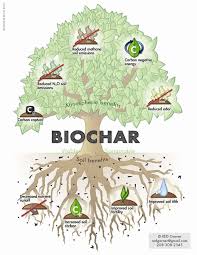Source: biochar-international.org
Published: February 7, 2017

Sustainable biochar is a powerfully simple tool to address some of the most urgent environmental problems of our time:
Climate Change
Sustainable biochar can be used now to help combat climate change by holding carbon in soil and by displacing fossil fuel use. Research shows that the stability of biochar in soil greatly exceeds that of un-charred organic matter. Additionally, because biochar retains nitrogen, emissions of nitrous oxide (a potent greenhouse gas) may be reduced. Turning agricultural waste into biochar also reduces methane (another potent greenhouse gas) generated by the natural decomposition of the waste. This powerfully simple tool can store 2.2 gigatons of carbon annually by 2050. Click here for more information on biochar and carbon sequestration potential.
Soil degradation and food insecurity
As a soil enhancer, biochar makes soil more fertile, boosts food security, preserves cropland diversity, and reduces the need for some chemical and fertilizer inputs.
Water pollution by agro-chemicals
Biochar improves water quality by helping to retain nutrients and agrochemicals in soils for use by plants and crops, resulting in less pollution.
Waste Management
Biochar production offers a simple, sustainable tool for managing agricultural wastes. A combination of waste management, bioenergy production, and sustainable soil management can succeed with an approach involving biochar.
Deforestation and loss of cropland diversity
By converting agricultural waste into a powerful soil enhancer with sustainable biochar, we can preserve cropland diversity and discourage deforestation.
